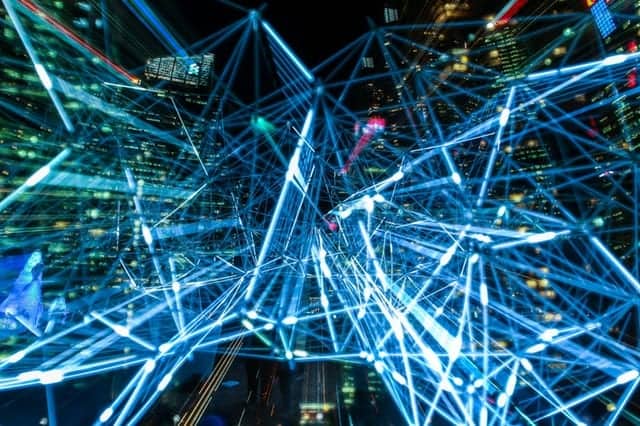
How to Learn Data Science
Data science is an in-demand career for good reason: data is everywhere you look on the Internet, from social media messages to the record of your purchases on e-commerce sites. Data helps businesses make more informed decisions and improve their services.
You may be wondering to yourself: how do I learn about data and data science? That is the question we’re going to answer in this article. We will start by discussing what you need to learn. Then, we will discuss resources you can use to study data science.
What You Need to Know About Data Science
The role of a data scientist is to collect, prepare, analyze, and interpret data. A data scientist starts with raw data, which is likely to be values formatted in different ways. This data is used to prove or disprove a certain theory that the data analyst has set out to study.
There are a few topics you should pay attention to when you start learning data science. Below, we list some of the key data science subjects you will need to know about:
- Data Science Theory: What is data science? What processes are used to inform data analysis? What is the difference between a data scientist and a data analyst? You should have answers to all these questions before you dive into analyzing datasets.
- Learning a Coding Language: Most data scientists use a programming language in their analysis (as opposed to business analysts who may only use dashboards). You should learn a programming language used for data science, like R or Python.
- Acquiring Data: You will need to know how to acquire data for analysis.
- Clean Data: Data cleaning, also called wrangling, is the process of preparing data for analysis. You will need to clean most datasets you use because not all datasets come formatted exactly how you want.
- Designing Hypotheses: You should be capable of designing a hypothesis and figuring out what data you will need to collect and analyze in order to come to a conclusion.
- Reporting and Data Visualization: After you have analyzed a dataset, you will need to turn your findings into something you can share with others. In most cases, data analysts convey their findings through charts and reports.
These are the main topics you will need to look at during the beginning of your data analysis journey, but keep in mind that our list is not comprehensive because data science is a vast field. As you grow more confident with data analysis, you will discover more fields you can explore, from machine learning to data visualization.
Skills Needed to Learn Data Science
To delve deeper into data science, you should feel comfortable working with numbers and statistics. A good understanding of statistics and how to apply them to solve problems will help as you start to conduct statistical analyses on datasets. Knowledge of a programming language is helpful; most data analysts use programming languages every day to analyze data.
All of the above prerequisites can be learned through practice and study. Data science is accessible to anyone who is interested in working with data and who is willing to put in the effort required to learn the subject. You do not need to be the best programmer or mathematician in the world to start analyzing data: all you need to know are the basics of coding, math, and statistics. You can learn the rest as you go.
Why You Should Learn Data Science
Learning data science will help you refine your analytical and critical thinking skills. Every day you will be faced with problems, from debugging programs to figuring out the right way to collect data from a survey. In each case, you will have to think analytically and critically to come up with the most efficient solution.
Aside from helping you refine these skills, learning data science will open up many job opportunities. Companies of all sizes, from smaller startups to tech giants like Facebook and Google, need people who are skilled in working with data. These job opportunities come with high salaries because data science is a complex specialized field that can take a long time to learn for professional purposes.
How Long Does it Take to Learn Data Science?
You will need to spend about four to six months learning the basics of data science, assuming you study for an hour or so per day. This includes data science theory, planning hypotheses, and learning what types of analysis you can conduct and how you can implement them in code. You will then need to spend a few more months refining your skills before you are ready for a job in data science.
Data Science Courses: A Study Guide
There are hundreds of resources online for people interested in studying data science, from courses to tutorials. We have created a list of some of the best data science courses to help you get started on your learning journey.
Data Science Specialization by Johns Hopkins University
- Resource type: Course
- Price: Free
- Audience: Beginners to data science. Beginner Python knowledge required. Familiarity with regression preferred.
During the ten modules of this course, you will learn the basics of data science. The course starts with an introduction to the tools and concepts commonly used in data science. You will then go on to use R for data analysis.
In this course, you will cover data gathering, data cleaning, exploratory data analysis, regression models, and more. The course ends with a capstone project designed to challenge you and help you build your skills.

Codecademy Data Scientist Career Path
- Resource type: Course
- Price: Codecademy Pro membership ($19.99/month)
- Audience: Beginners to data science
The Codecademy Data Scientist Career Path guides you through everything you need to know to effectively analyze a dataset, from the basics of data science to using Python. You will learn about data acquisition, manipulating data, using summary statistics, and more.
Throughout the course, you will work on a series of portfolio projects. These projects are designed to challenge you. If you decide to pursue a career in data science, you can use these projects to showcase your skills.
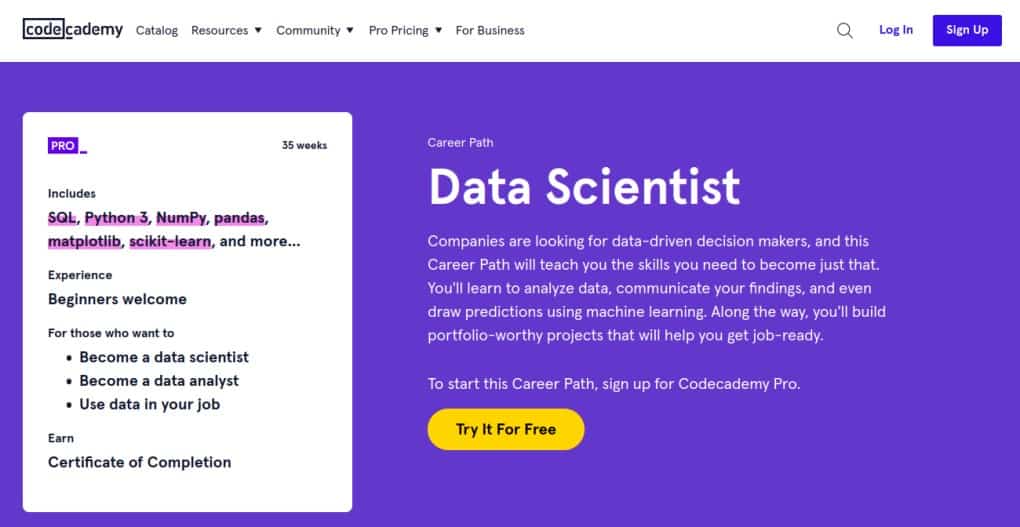
Introduction to Data Science in Python
- Resource type: Course
- Price: Free
- Audience: Intermediate data science developers
This course is designed to help you learn Python data analysis tools. Python is commonly used for data science and has many libraries on which you can depend to derive insights from a dataset.
You will start by learning the basics of manipulating data in Python. Then, you will learn about data processing with Pandas and answering questions with data. Through the course, you will learn how to apply various parts of data science theory in Python programs.
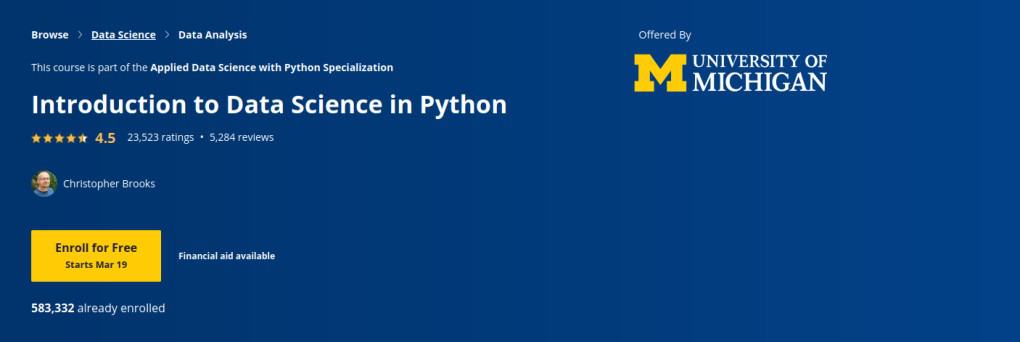
Data Science: Foundations using R Specialization
- Resource type: Course
- Price: Free
- Audience: Beginner
This course will teach you the basics of data science and using R to analyze data. You will clean data using R, analyze data, and then prepare visualizations based on the data. You will use GitHub, a popular code collaboration and sharing tool, to manage your data science projects.
At the end of each module, you will need to complete an applied learning project. These projects will help you build your skills and practice applying the theory you have learned in the classroom to various R projects.
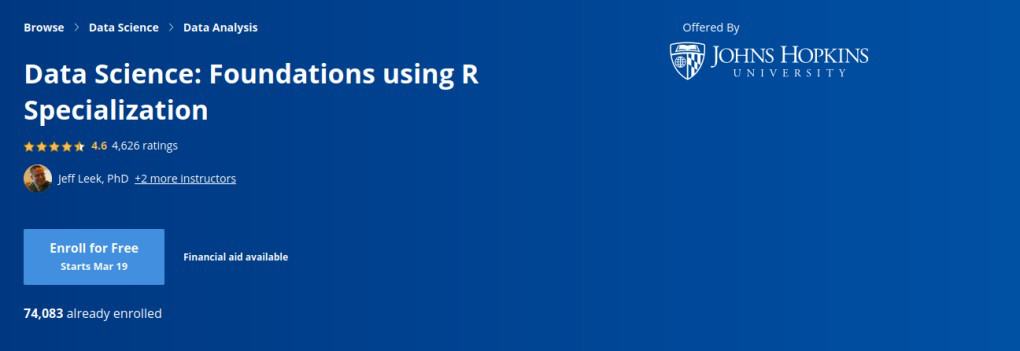
Udacity Data Science Nanodegree
- Resource type: Course
- Price: $399/month
- Audience: Beginners to data science. Python, SQL, and statistics knowledge necessary.
This course—developed in collaboration with companies like Starbucks, Kaggle, and IBM Watson—will teach you what you need to know to become a data scientist. You will learn the data science process, software development as a data scientist, data engineering, and more.
The course ends in a capstone project designed to help you reinforce your skills. This project is open-ended so you have some discretion over the direction in which you take your project. You will also be able to consult course mentors throughout your journey if you have any questions about your studies or if you need any assistance.
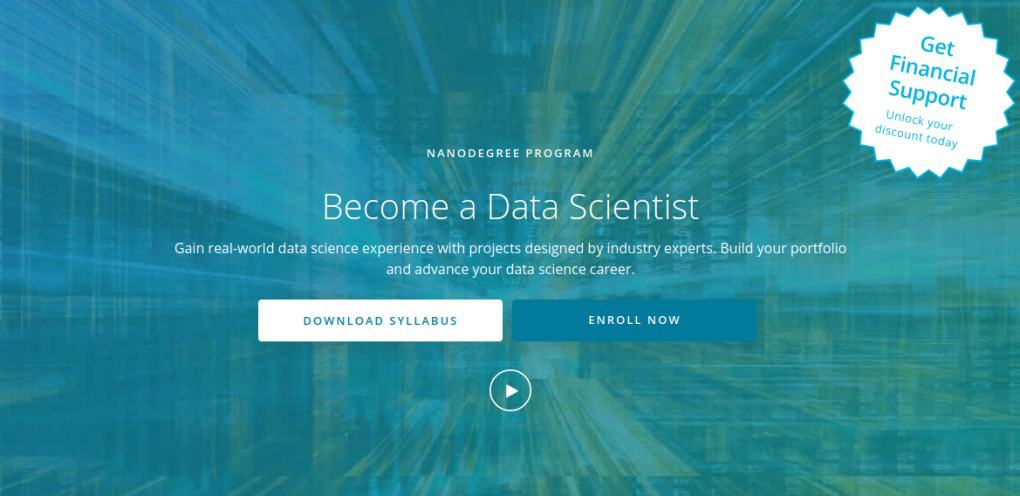
Communities for People Studying Learn Data Science
There are plenty of data science communities online which you can join. Participating in a community is a great idea if you want to meet new people or if you need help solving a data science problem. Below we have created a list of some top data science communities you may want to consider joining.
Kaggle
Kaggle is perhaps the best-known data science community. Featuring tutorials, datasets with which you can work, competitions, and now web forums, Kaggle is a great place to go to participate in the data science community. The competitions are a good way to reinforce your skills and to build your portfolio. The web forums will give you a chance to chat with other data scientists about topics in which you are interested.
r/DataScience
The r/DataScience Reddit community is more conversational than other online communities. On the data science Reddit thread, you will see questions about data science careers, time-series analysis, neural networks, and more. With over 427,000 members, this community is certainly popular, and there are people sharing posts every day.
Stack Overflow
Stack Overflow is a good place to go if you have questions about coding. There are thousands of threads on Stack Overflow related to data science, from solutions to common errors with Python frameworks to discussions on how to solve issues while coding in R. If you do not see a solution to your question, you can always ask the community directly.
How Hard Is it to Learn Data Science?
Learning data science will take a big investment of time and effort. You will need to be comfortable working with mathematics, statistics, programming, and data if you want to be a successful data scientist, and all of this takes time. You will certainly encounter challenges along the way; overcoming them will take some time. However, If you are passionate about working with data, you should not have too much trouble becoming a data scientist.
Will Learning Learn Data Science Help Me Find a Job?
Data science is one of the most in-demand skills in the technical job market at the moment. As a result, skilled data scientists generally have no trouble finding employment, whether at technology startups, prestigious technology companies, or at companies in other industries.
Below, we have curated some data science career statistics to help you evaluate the job market.
- Salaries: The average data scientist earns $113,309 per year, according to Glassdoor.
- Job Openings: There are 30,237 open jobs for data scientist positions on Glassdoor.
- Industry Growth: Demand for computer and information research scientists, which include data analysts, is expected to grow by 15% between 2019 and 2029, according to the US Bureau of Labor Statistics.
These statistics make one thing clear: data science is a lucrative career path.
Conclusion: Should You Learn Data Science?
Data science is the study of data. As a data scientist, you will collect, clean, and analyze data. You will also draw conclusions from the data you have analyzed. If you enjoy working with numbers, statistics, and data, a career in data science is a path you should consider exploring in more depth.
You will need to spend months building a basic understanding of data science and even longer refining your skills. But this will pay off. Data scientist jobs pay well and are in good supply, so you should have no trouble finding a job that is right for you. Take some time to think about your interests and see if they align with the kind of work you would be doing as a data scientist.


